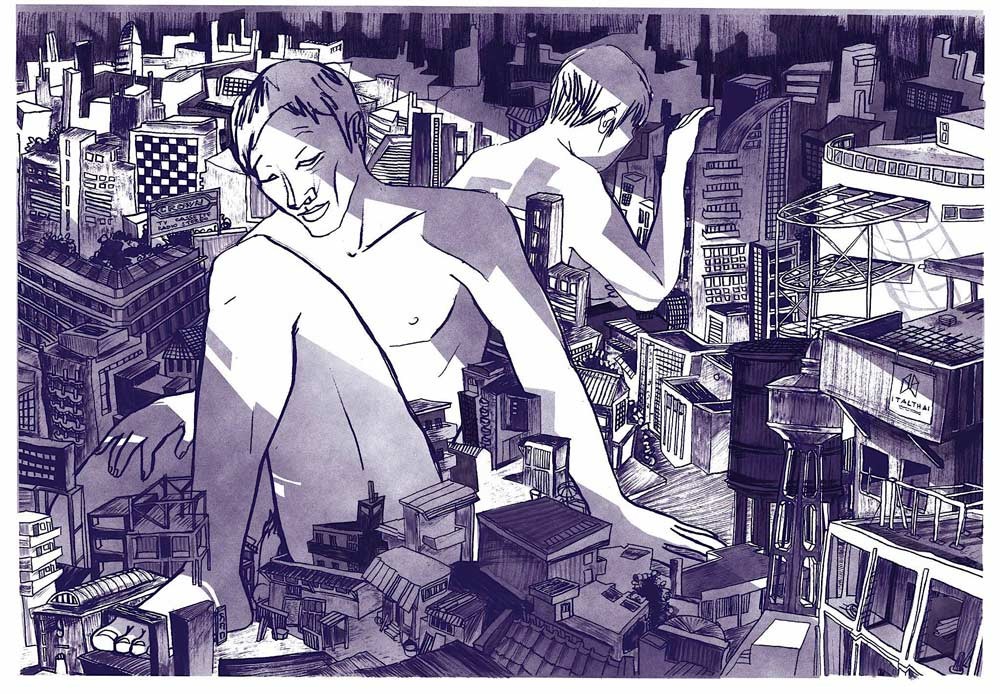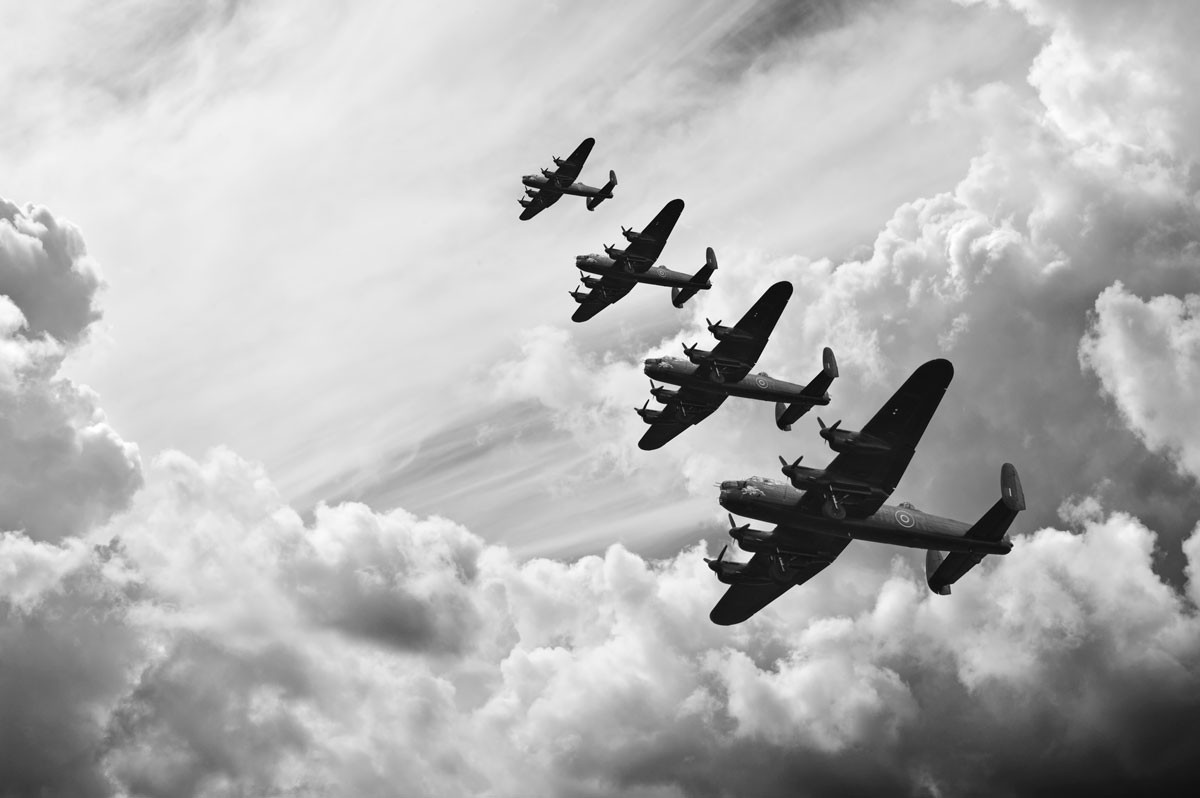
Guest contribution by Wirawat Somnuek
“… he was blinded by a single bullet lodged in his skull, but he gained a new sight from the very same bullet. And when he awakened to the new sight, he saw that the country in which he lived was covered in darkness. There was no escape, no refuge, and no justice. There was no place for his faith. Everything that he once laid eyes on was but an illusion…”
The above passage is from the graphic novel Ta Sawang (Awakened) by Claudio Sopranzetti, which was translated from the Italian original Il Re di Bangkok into Thai and published this year by the Reading Italy publishing house.
The novel draws on historical events in Thailand between 1977 and 2007 and presents a fictional story and characters that are a composite of true events and people. The story is also informed by a decade of anthropological research in Thailand and hundreds of hours of interviews for the author’s dissertation.
It was co-written by Chiara Natalucci, illustrated by Sara Fabbri and translated into Thai by Nuntawan Chanprasert.
The main protagonist, Nok, whose nickname translates as “bird,” is a composite construction of the real people interviewed by Sopranzetti.
Nok’s story unfolds over a period of 30 years and comes to head in May 2010 when the protest of the United Front for Democracy against Dictatorship (UDD) was dispersed with lethal force on the orders of the government led by Prime Minister Abhisit Vejjajiva. In the commotion, Nok experiences his awakening.
A former farmer from Udon Thani, rural poverty drives him towards Bangkok for work in 1982.
After living in the capital for sometime, Nok finds a livelihood for himself as a motorcycle taxi driver. He makes friends, discovers a social life, has a steady income, and eventually, discovers an interest in politics.
The novel gradually shows how politics affects every aspect of not only Nok’s life, but also that of his family.
Living in Bangkok, he tastes freedom like the animal of flight he was named after. It makes him realize that, if born a human, one really must have freedom as a basic necessity.
He becomes a member of the Red Shirt movement following the example of some of the friends and acquaintances he has in his social circle. These people begin to agitate and protest against the issues in the country which they saw as unjust. Eventually though, their plot twists.

Eyes opened: a seeker in Bangkok
In 1982, General Prem Tinsulanonda was Prime Minister and the Thai state lavishly celebrated 200 years of the Rattanakosin era, lauding itself for being a stable, bicentennial nation. It was a time when the country was recovering from the communist insurgency, and the economy was on an upwards trajectory. All of this energy shook migrant workers loose from the countryside, in particular those from Thailand’s Northeast.
That year, Nok, like so many other inhabitants of the rural Northeast, is welcomed by his relatives as he arrives in Bangkok full of hopes for opportunity.
At first he scrapes by with the most meagre of incomes, until one day, he finds out that he was only receiving half the wage he was supposed to get. The other half was going to the relative who got him the job. When confronted by Nok, the family member has Nok sacked and throws him out of his lodgings.
This is the first lesson bestowed upon him by Bangkok, the city of his dreams. It teaches him to deal with a calloused hand. It teaches him that it is every man for himself. It teaches him that to the loser there is nothing but insignificance and the dark shadow. Nok becomes one with the city.
Fate would have him cross paths with Hong, an older laborer from Loei province. He helps Nok along to the next chapter of his life in the capital. Nok starts a new job as a porter in a market. His life starts to improve a little. Words like “economy’s good, it’s easy to find work” begin to escape his mouth in tune to the melody of Carabao’s “Sa-Udon”, which was big on the radio at that time. The song sang the lives of the migrant workers from the provinces as they went far and wide in search of cash.
Nok begins to view Bangkok in a good light again, and sparks an interest in politics.
In 1985, Nok praised the capital as “developing more and more each year, just as we are.” This was despite the attempted coup of September 9, 1985 that tried to unseat the government of General Prem. The economy only continues to improve, and even ice-factory workers like Nok can save up to buy a motorcycle.
Feeling like he has reached a certain degree of success in Bangkok, Nok wants to return home. He wants to show everyone that his quest for the big city wasn’t for nothing.
Illusions shattered: returning home with nothing
Nok returns to his home in Udon Thani to take part in the military conscription lottery, ordain as a monk to fulfil his filial duties, and marry his sweetheart, Kai. But his timing is to be marred by the bloody events of Black May 1992. The violence ends when the television screen shows images of Major General Chamlong Srimueang and General Suchinda Kraprayoon kneeling before King Rama IX.
“That was a day that the two of us, and the whole country, will never forget. It was like the start of a new life,” Nok says.
Later on in 1993, the economy shows no sign of slowing down, so much so that words like “our country is going to be as rich as America” are bandied about.
It was during that time Nok and Hong agree to go and work as construction laborers on Koh Phangan. Nok wants to make more money to send home to his wife and child in Udon Thani. But things don’t pan out as planned.
His employer needs laborers to build the resorts for the growing numbers of tourists. Nok has to work harder and harder.
Yaba [methamphetamines] are added to the water at work by his employer. He wants his workers to be alert and lively. In the end, Nok gets addicted to the drug.
The book contains a passage with a powerful metaphor from Nok: “The boss did me like Bangkok did. They both used me like I was an animal. I’m only working here because I need the money for my family, money that my family needs more than ever. Good thing I have the yaba to keep me going.”
In the end, all the money he makes is spent on more yaba. He doesn’t send any money home. His child is growing up, and his father dies before he could go home to see him one last time. But then the 1997 tom yum kung economic crisis forces him to return to Udon Thani–with empty pockets.

The book cover of Ta Sawang by Claudio Sopranzetti, co-written by Chiara Natalucci, illustrated by Sara Fabbri, and translated into Thai by Nuntawan Chanprasert. Published by Reading Italy. The English version is expected to be ready next year.
Blindsided: a tiny life on the national highway of politics
Thaksin Shinawatra wins a landslide election and becomes prime minister in 2001, with the promise that they would all be “shareholders of the nation.”
Nok decides then that he would go to Bangkok one more time, this time with his family, to seek opportunity. This time, as a motorcycle taxi driver, he would be his own boss. At one point, when his taxi rank is extorted by some policemen, he and his fellow motorcycle taxi drivers band together and demand justice. Those policemen eventually end up in court. It fills them with confidence that their voices have power.
To Nok’s eyes, it looks like the voices of poor people like Nok and his family are important to Thaksin. Even his wife says, “Thaksin is really making everything liven up.”
It shouldn’t have come as any surprise that Thaksin would win another landslide victory in the 2005 general election. Yet, there were those who moved to discredit the prime minister and oust him from power. In 2006, early in the morning of September 19, a military coup achieved just that.
Nok had been paying attention to political activists. His family even agrees with him that it is time to come out and show their opposition to the coup.
They had to because that was a government that had been voted in by them, the people. In 2009, Abhisit Vejjajiva held the post of prime minister, despite not being voted in by the electorate.
Thousands came from the provinces to protest against the government. They called themselves the “Red Shirts,” and they demanded the resignation of Prime Minister Abhisit Vejjajiva in the middle of March 2010.
Hong is one of the many who volunteered to facilitate the protests. When he is free from his shift at the motorcycle taxi rank, he is found at the protests alongside many other red shirts who had volunteered as security for the gatherings. Some of them keep a watchful eye on the movements of the military.
But on May 19, 2010, patience snaps. The military moves in to disperse the protests, resulting in at least 94 dead. Among the dead is Hong. Thousands are injured, including Nok. He has been shot in the head and blinded by the bullet lodged so deep in his skull that it could not be removed.
Awakened: the only constant is change
The writer tells through Nok that over the span of 30 years, the struggle was not only Nok’s, or of those around him. It was a struggle that went down the political path of the various groups involved. It made Nok reevaluate himself and discern his own needs.
All he ever really wanted was a simple life in the countryside, surrounded by family and good friends. Everything that happened taught him what it was that he really wanted, and showed him what he never wanted to revisit.
Ta sawang–or ‘awakened’–here doesn’t mean that he is turning his back on the events leading up to and during his political activism. His awakening didn’t happen overnight, either, but is a gradual accumulation, an eventual manifestation at the right time. We cannot say when the right time was or will be.
The awakening is neither a state of being completely free from illusions or negativity, nor is it a state of absolute clarity. It is simply the full awareness of something, and the discernment of whether it is good or bad.
At the end of the book, the writer invites us to consider whether Nok has given up on politics and activism, which is possible. At the same time, finding himself and being with those close to him more than ever, could lead to a new beginning that comes from a reevaluation of the past.
The writer concludes that the activism and struggles that Nok partook in were successful, once upon a time. But the same method might not be the best way in the contemporary context. If Nok were to mobilize for political ends once again, he might do well to spend some time reflecting on the best way to do so for the times that he is living in.
This story was first published in Thai on May 14, 2020. Translated and edited by The Isaan Record.
ซีรีส์ชุด “1 ทศวรรษ พฤษภาฯ เลือดปี’ 53” (13) – ‘ตาสว่าง’ใน “พฤษภาฯ 53” กับการเดินทางไกลของคนเสื้อแดง




